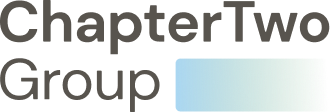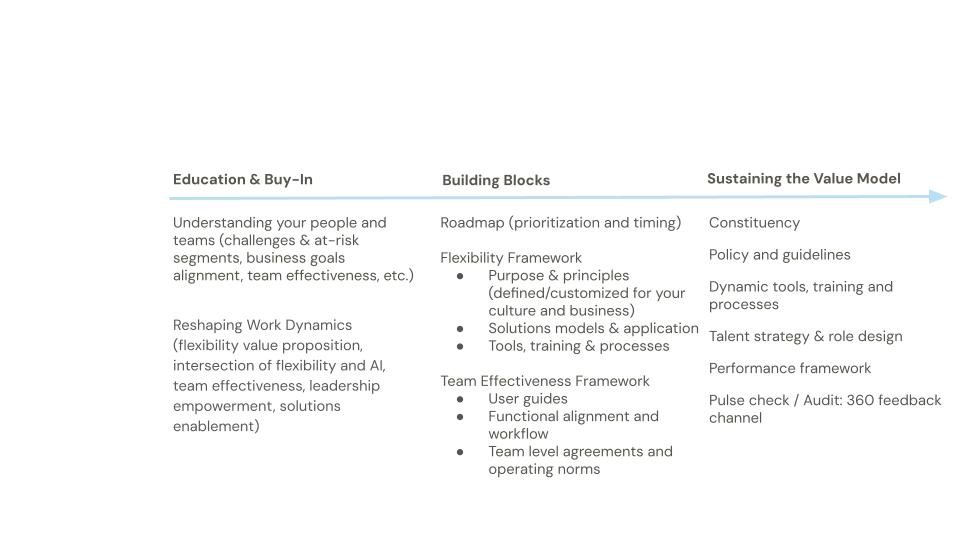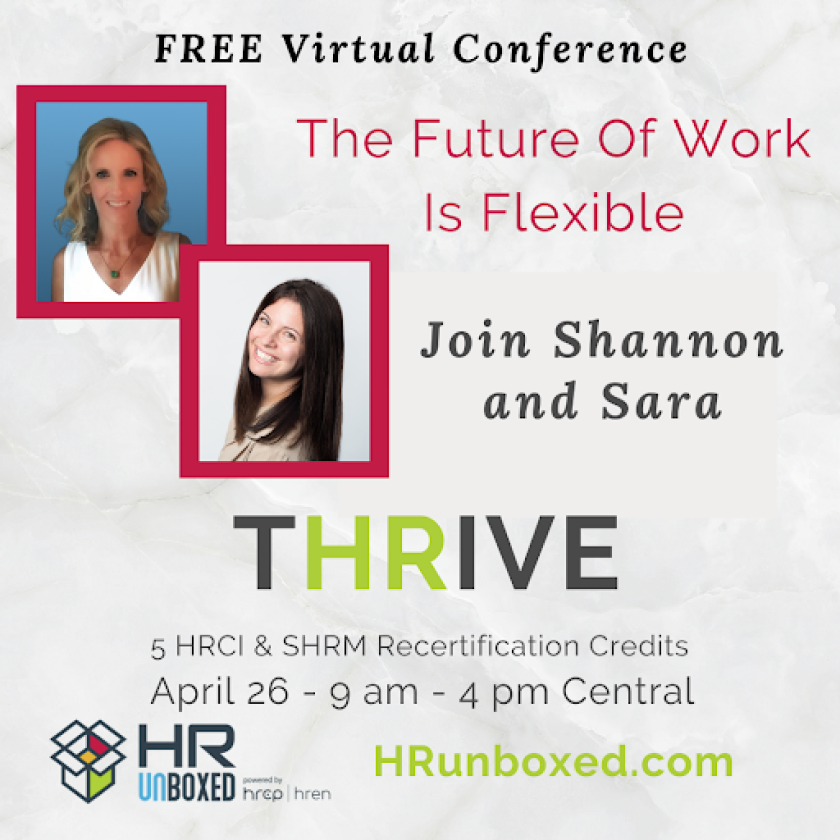
Building for the next chapter of work.

At ChapterTwo Group we help clients build for the next chapter of work, where a people-first culture that empowers individuals and teams to work their best is the foundation of a thriving business.

As co-founders of ChapterTwo Group, we are “future of work” thought leaders and business consultants on a mission to help organizations and teams re-imagine workplaces.
After 15 years in front-line sales working with Fortune 500 partners at Google, we joined forces in a pivotal career shift to derive more value in our work and balance in our lives. As a job-share team, we developed and launched a new philanthropic agency program for Google Ad Grants, and were co-founders of Threadit, a video-messaging product designed to improve productivity, connectedness and fulfillment in an evolving workplace. Along the way we became champions for flexibility, pioneering the concept and value of job-sharing across multiple organizations within Google.
This passion for flexibility inspired ChapterTwo Group. We believe when you do the right work, at the right time, in the right space, with the right people - everyone wins. We partner with our clients to build for the next chapter of work, where a people-first culture that empowers individuals and teams to work their best is the foundation of a thriving business. As seasoned business professionals and modern-work practitioners, we provide the tools and support you need to develop successful and sustainable workplace programs: assess workforce challenges, identify and pilot solutions, and lead workshops/trainings to help leaders and teams embrace and innovate for a more inclusive and productive work environment.
We look forward to partnering with you!
About
Our Story
Sara Wiita
Shannon Crile

Our Mission
We believe when you do the right work, at the right time, in the right space, with the right people - everyone wins. Our mission is to help shape the next chapter of work where people thrive without sacrificing business priorities or results.

Our Superpowers
Business Case Development
Stakeholder Relationship Development
Cross Functional Coordination
Program Development and Management
Pilot Testing and Impact Analysis
Team Alignment and Effectiveness
Innovative Team Building
Solutions Enablement

The Future of Work is Flexible
“Never waste a great crisis. We have a once-in-a-generation, once-in-a-lifetime opportunity to finally fix workplaces.”
–Reshma Saujani
CEO/founder of Moms First & founder of Girls Who Code

the future of work
A New Imperative
The modern workplace is transforming. The days of 9-5, butts in seats are gone - and there’s no going back. Covid spurred a massive upheaval, unleashing feelings of discontent and burnout that had been bubbling under the surface for years. In this post Covid era, people are no longer willing to sacrifice their well-being for a job. Flexibility has emerged as the new imperative.
Workplace flexibility embraces the idea that employees can be productive, effective contributors no matter when or where they perform their work. Rather than enforcing a rigid workplace environment or schedule, workplace flexibility acknowledges individual needs and gives people the resources and support they need to be successful.

Modern Workplace Value Model
The Workplace Value Model illustrates the critical connection between business goals and individual and team health. When employers invest in their people they feed a self-reinforcing cycle that amplifies results and fuels continuous growth.

Flexible Work: The Time is Now
We’ve already seen positive strides toward an evolved working world. Many companies are embracing hybrid work models, giving employees more freedom in where they work. While this is certainly a step in the right direction, there’s a lot more work to be done. Research indicates that for the post Covid workforce, the “when” and the “how” work gets done is arguably more meaningful.
Future Forum’s quarterly Pulse survey of more than 10,000 knowledge workers across six countries found that while location flexibility is important — with 79% of workers saying they want flexibility in where they work — schedule flexibility is in fact even more important — with a whopping 94% of workers saying they want more control over their schedule.
So how can we give people schedule flexibility without sacrificing business priorities and results?
The answer is becoming increasingly clear. Flexible work yields better output. Even more surprising, reduced hours can actually improve business metrics. Multiple large-scale four-day (32 hour) work week trials support these revelations.
Among reporting countries in a recent 4 Day Week study conducted by nonprofit 4 Day Week Global (4DWG), revenues rose an average of 8.14% and increased a massive 37.55% in comparison with the same period the previous year. Less surprising of course are the benefits for employees. The same 4DWG study reported that job satisfaction was higher for more than 45% of participants and 60% said it improved work-life balance. Moreover, 32.4% said their stress levels had gone down over the trial period. Another study from the American Sociological Review found that workers with flexible schedules slept better, felt healthier, and experienced less stress - and were more likely to stay with an organization long term.
It’s time to re-set the system. To do this, employers must embrace today’s diverse workforce and give people the tools and resources they need to deliver their best work.

“Productivity” is overrated and improperly rated. It’s not about how many hours you work, or if people see you at work, it’s about the value you bring to the work.

-
*Flex time
*Compressed work week
*Reduced hours / part time
*Job-sharing or work sharing
*Remote or Hybrid work
*Annualized or banking hours
*Phasing in or out programs
*Paid leaves and sabbaticals
Value > Volume
The key to success is approaching flexibility with a focus on scope of work, qualitative outputs and overall business impact.
“Productivity” is overrated and improperly rated. It’s not about how many hours you work, or if people see you at work, it’s about the value you bring to the work.
A common pitfall is getting caught up in quantitative, time-bound outputs (presence, call volume) and structural nuances rather than grounding in meaningful, quality-based metrics that drive business impact.
If you have the right business structure in place (mission, business goals, employee rubric, management practices) then offering flexible solutions only empowers people to work their best.
-
Job-sharing is a workplace flexibility solution in which two employees with mutually relevant experience and a complementary skill set each work part-time to fulfill one full-time role.
Our Journey to job-sharing:
After years of working heads down and following the mantra of an early mentor at Google to just “Lean In”, we finally came to the painful realization that - as much as we wanted to - we simply couldn’t “do it all”. At least not in a way that felt successful. With this epiphany, we set off on a mission to find balance. But it wasn’t until we discovered job-sharing that we experienced a true breakthrough. Through job-sharing, we could finally be our best selves, both personally and professionally.
Because job-sharing was, and still is not widely understood or adopted, it wasn’t always an easy road. We were met with baseless objections and scrutiny - and in the back of our minds, we were always waiting for the other shoe to drop. We knew we were the “lucky ones”. Many around us (often moms) continued to struggle to meet the demands of work and life and were forced to make the impossible choice to leave the workforce.
Today, the world looks a little different. The modern workplace is transforming and flexibility has become a non-negotiable. Job-sharing is a practical, effective solution to meet the growing demand for flexibility. We know what it takes to make job sharing successful and want to share our knowledge and experience to help companies embrace job sharing and other flexible work solutions.
Myth vs Reality
*It's the same as part time…
*It’s only for moms..
*It attracts people who aren’t driven or career-oriented…
*It can only work in a handful of entry level jobs or specific industries…
*It’s a career dead-end
How is job sharing different from part time?
Historically, reduced hours or part time work at the individual level (vs. team or company wide) has come with challenges. For instance, when someone is working part-time on a team, continuity can really suffer. Often it creates a bottleneck for the rest of the team, who have to wait for the part-time person to move things forward. On the flip side, the part-time person often overcompensates for their part-time status by working longer hours or extra days.
Many of the limitations and challenges of working part time can be mitigated through job-sharing.
-
Understand and listen to your workforce: who are they (demographics, psychographics, etc.) and what do they care about? Give employees a voice through 360 surveys, town halls, and/or affinity groups.
Define / refine a flexibility purpose: what is the value of adopting flexibility for your business? How does it align with your organization’s overall mission and purpose?
Bring in stakeholders and establish sponsorship / ownership: stakeholders can ensure that the right policies and guidelines are cemented, thereby avoiding “crash and burn” scenarios that fail to embed flexibility programs into the culture of your organization.
Test ahead of significant investment or commitment: testing is lower risk, lower fidelity and much cheaper than making a broad sweeping change to people programs.
Evaluate training needs for employees, teams, managers & organizational leaders: enhance and/or develop flexibility training curriculum to advance the shift from historical norms and infuse flexibility values into your cultural DNA.
Build for the long term: implement policies and guidelines to ensure consistency and accessibility across the org; invest in ongoing training and performance frameworks grounded in the work vs the arrangement.


Our services
Our Blueprint*
Building for the next chapter of work.
Our scope
of work
and key
outcomes
*A blueprint is a guide for making something - it’s a design or pattern that can be followed.

Who We Are
We are seasoned business professionals and modern-work practitioners who understand that imagining - let alone building for a new way of work can feel overwhelming. With 20+ years of experience supporting and growing business in a non-traditional model, we are adept at navigating change while upholding business priorities.
We provide the tools and support businesses, teams and individuals need to thrive in an evolving workplace. This includes assessing workforce challenges, aligning disparate working groups, educating stakeholders, and introducing solutions that balance people needs with business priorities.
We engage at any stage through various approaches, such as leadership huddles, small discussions, or group workshops, to promote a culture of inclusivity, adaptability and innovation.

Our Clients
SMB: Small to mid-sized companies facing people challenges, cultural growing pains, and/or who are looking to develop new teams or next set of leaders, or shift culture to align with strategy.
Enterprise: Larger companies and/or teams looking to reshape process and overcome obstacles including team alignment, attracting and/or engaging top talent, leveraging culture as a differentiator, and evolving workplace value to amplify business priorities.
Start-Ups: Start-Ups or early stage ventures who are establishing norms and core values, and want to build culture with a flexibility purpose and team effectiveness mandate.

"The session was fantastic! We left feeling energized, and with clarity, as we continue to move the team level agreement forward. We can't thank you enough!"
-Lauren Gniazdowski, COO, Good Words

featured work
Worth a read, watch, visit…












